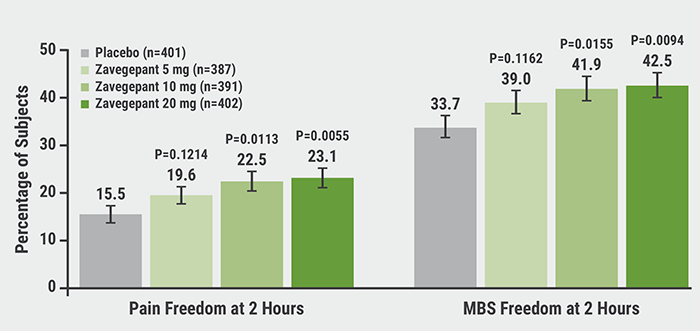https://doi.org/10.55788/2f511946
PROGRESS (NCT03855137) was a global 12-week, double-blind, parallel-group, phase 3 trial [1]. It was set up to evaluate the efficacy, safety, and tolerability of atogepant in adults with chronic migraine. The participants were randomised 1:1:1 to atogepant 30 mg twice daily, 60 mg once daily, or placebo. The primary efficacy endpoint was change from baseline in MMDs after 12 weeks.
Of 778 participants, 773 were included in the safety population and 755 in the modified intention-to-treat (mITT) population. The average age was 42 years; 88% were women; 59% were White and 36% Asian. The double-blind treatment period was completed by 89.2% of randomised participants. At baseline, the mean MMDs were 18.6–19.2 across groups. The mean change after 12 weeks was -5.1 days for placebo, -7.5 days for atogepant 30 mg twice daily (difference vs placebo -2.4 days; P<0.001), and -6.9 for atogepant 60 mg once daily (difference vs placebo -1.8 days; P=0.0009).
For all secondary outcomes, significant improvements were noted in both active treatment arms. A key secondary endpoint was the proportion of patients with a ≥50% reduction in 3-month average of MMDs. This endpoint was achieved by 26.0% in the placebo group, 42.7% in the atogepant 30 mg twice-daily group (P=0.0003 vs placebo), and 41.0% in the atogepant 60 mg once-daily group (P=0.0009 vs placebo).
Atogepant was generally safe and well-tolerated, with no new safety signals. Treatment-emergent adverse events (TEAEs) were reported by 49% in the placebo group, 56% in the atogepant 30 mg twice-daily group, and 63% in the atogepant 60 mg once-daily group. The most frequent TEAEs in these 3 respective groups were constipation (3%, 11%, and 10%, respectively) and nausea (4%, 8%, and 10%). Serious TEAEs were reported by 1%, 2%, and 3%; none were deemed treatment-related.
- Pozo-Rosich P, et al. Atogepant for the preventive treatment of chronic migraine: results from the PROGRESS phase 3 trial. P103, EHC 2022, 07–10 December, Vienna, Austria.
Copyright ©2022 Medicom Medical Publishers
Posted on
Previous Article
« EHF consensus on effective migraine treatment and triptan failure Next Article
Large gaps worldwide in prophylactic treatment of migraine »
« EHF consensus on effective migraine treatment and triptan failure Next Article
Large gaps worldwide in prophylactic treatment of migraine »
Table of Contents: EHC 2022
Featured articles
EHF consensus on effective migraine treatment and triptan failure
IHS President: “It is time for operationalisation of ICHD”
Headache Prophylaxis
Intervention
EHF consensus on effective migraine treatment and triptan failure
Sustained long-term effect of occipital nerve stimulation in MICCH
Onabotulinumtoxin A effective in older patients with chronic migraine
What to do when conventional treatment of headache fails in children
Predicting response to medical and surgical treatment of trigeminal neuralgia
Breakthroughs in Understanding Headache
IHS President: “It is time for operationalisation of ICHD”
GWAS identifies 7 loci for cluster headache
Towards precision medicine: salivary CGRP and erenumab response
Persistent headache after stroke: not rare and often overlooked
Additional effects of gepants on top of erenumab
Headache Prevention
Idiopathic intracranial hypertension: key factors influencing visual outcomes
Patients with migraines smoke less, drink less, and use fewer illicit drugs than general population
Related Articles
September 10, 2020
Long-term cardiovascular safety of erenumab

© 2024 Medicom Medical Publishers. All rights reserved. Terms and Conditions | Privacy Policy

